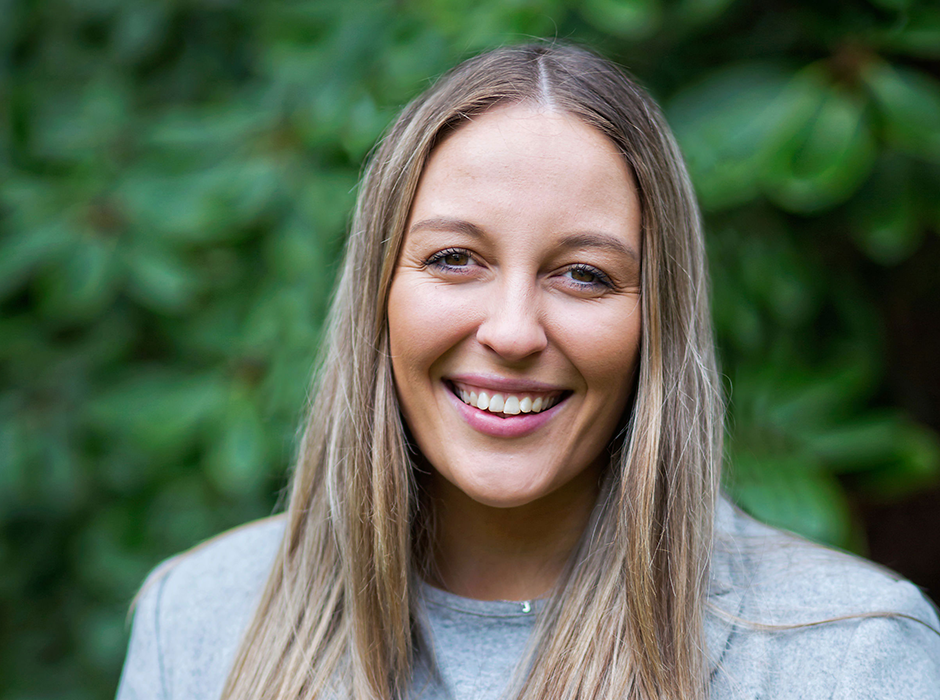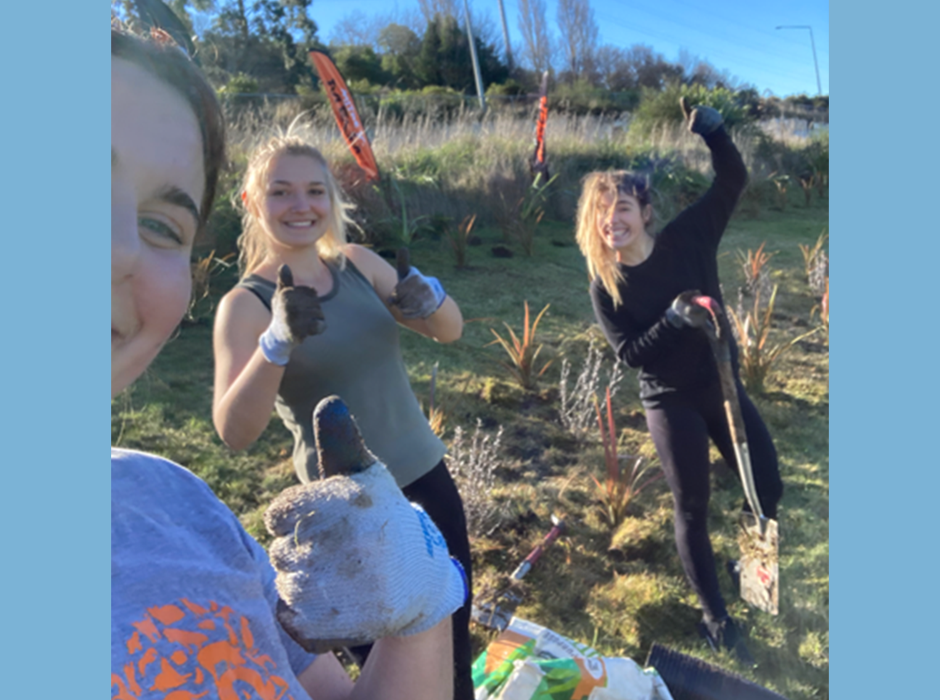
Sustainability Office Engagement Team Lead Jes Triscott has been recognised with an Australasian Green Gown Award for her substantial contribution to sustainability efforts at Otago.
It is official, our University’s Sustainability Office Engagement Team Lead Jes Triscott is a champion – she was joint winner of the staff sustainability champion category at the Australasian Green Gown Sustainability Awards streamed live from Melbourne last Thursday night.
Highly commended awards were also bestowed on our Sustainability Neighbourhood Tētēkura/Student Lead Demi Lawrence in the student sustainability champion category, and on our Sustainability Office’s summer scholarship programme Te Pūhau ana te Rā in the next generation learning and skills category.
Chief Operating Officer Stephen Willis says we have always known Triscott is a champion, so it is great she has got the well-deserved recognition for all her mahi and the unique way she does it.
Our highly commended awards also signal a brighter future, as they both involve our students working towards sustainability.
Sustainability staff champion
Tumuaki o Toitū te Taiao Head of Sustainability Dr Ray O’Brien says, “since 2019, Triscott has created a diverse portfolio of initiatives that have real impact and are often above and beyond the role she was employed to do.”
“Rather than deliver an event off a prescribed calendar, Jes has an uncanny ability to take a good idea, break it apart, look at it through different lenses and produce something with greater impact that resonates much more with the target audience.”
And the way she creates opportunities for her team of Tētēkura/Student Leads, to develop and grow is a huge contribution to the future of sustainability.
She gains support for her work and raises awareness by having an “authentic personality, gentle humour and genuine belief in sustainability” – which has forged strong sustainability relationships city-wide, O’Brien says.
Triscott says while the award is for an individual, it actually reflects having an epic team and the support it provides.
The mahi
Triscott also won an international Green Gown Award this year for student engagement, for our Te Oraka thrift shop and sustainability hub, which hosts household product refill stations, sustainable skills workshops, refurbished bike sales for koha, inclusive events and gatherings, night markets for students’ businesses, and rummage sales to support charity.
Te Oraka now hosts a social club as well, nurtured by a calendar of educational events for students.
In just her first year at Otago, Triscott initiated our campus cafés becoming disposable cup free (all were onboard early the following year), created a student volunteer network (later gaining funding to employ six part-time students annually to lead them), introduced the Green Your Scene programme for staff and student volunteering, and delivered the Australasian Campuses Towards Sustainability conference in Dunedin.
In response to feedback, Triscott later crafted a bespoke engagement programme more clearly positioned in Aotearoa New Zealand, Green Your Scene. During the COVID pandemic lockdown, she switched the focus to wellbeing.
Green Your Scene has attracted 153 teams that generated 6,464 actions and 23 projects. It also gave awards to initiatives that ranged from a community garden to possum trapping.
During national sustainability weeks, Triscott has collaborated with up to 38 groups to host up to 19 events over five days, which included pushing sustainability boundaries to include inclusivity.
Triscott developed our University’s sustainability engagement branding guide and communication approach, while integrating Te Ao Māori in her work by including the language in job titles, having a Māori artist design merchandise, and supporting Māori students to help create our University’s sustainability strategic framework.
Triscott has recently become a representative on our University Equity Committee.

Demi Lawrence (centre) helping with sustainability mahi by planting out an area in Dunedin with Students for Environmental Action - SEA Ōtepoti.
Highly commended student champion
Sustainability Neighbourhood Tētēkura/Student Lead Demi Lawrence – highly commended in the student sustainability category – was so inspired by living there as a student, she suggested the Tētēkura role be established then successfully applied for it.
She is dedicating at least 400 hours to sustainability this year and contributed about 300 last year while studying Human Geography, minoring in Environmental Management, then a Master of Sustainable Business.
For two years, Lawrence was the Students for Environmental Action co-president, where she fostered a collaborative sustainability community on campus and initiated the biannual Clothes Swap that is now one of its most popular events.
During a Sustainability Office internship funded by Te Whatu Ora Health New Zealand, she researched reducing Dunedin Hospital’s food waste.
She is also completing a two-year Student Leadership Award programme sponsored by Canon that involves sustainability volunteering, and is the student representative for some University papers that include sustainability.
Highly commended next generation
While summer scholarships are common in academia, having a Sustainability Office host them is not.
Students doing its annual list of research projects have informed changes to Dunedin’s public transport, supported reducing student accommodation food waste, created a plan for establishing Te Oraka, informed workplace travel surveys, provided evidence for native forests to be registered in the emissions trading scheme, and gathered information for the procurement process to replace an LPG boiler with electricity.
Summer scholarship students have gone on to full scholarships, employment as a fulltime University analyst, and short-term local government contracts to replicate their work in another context. Several have also had their work published in the journal specifically set up to compliment these scholarships and the work of other undergrads and emerging researchers.
The scholarship programme’s name, Pūhau ana te rā, refers to travelling with your sails full of wind and reflects the New Zealand Climate Change Commission saying tail wind conditions would accelerate us towards our targets earlier.